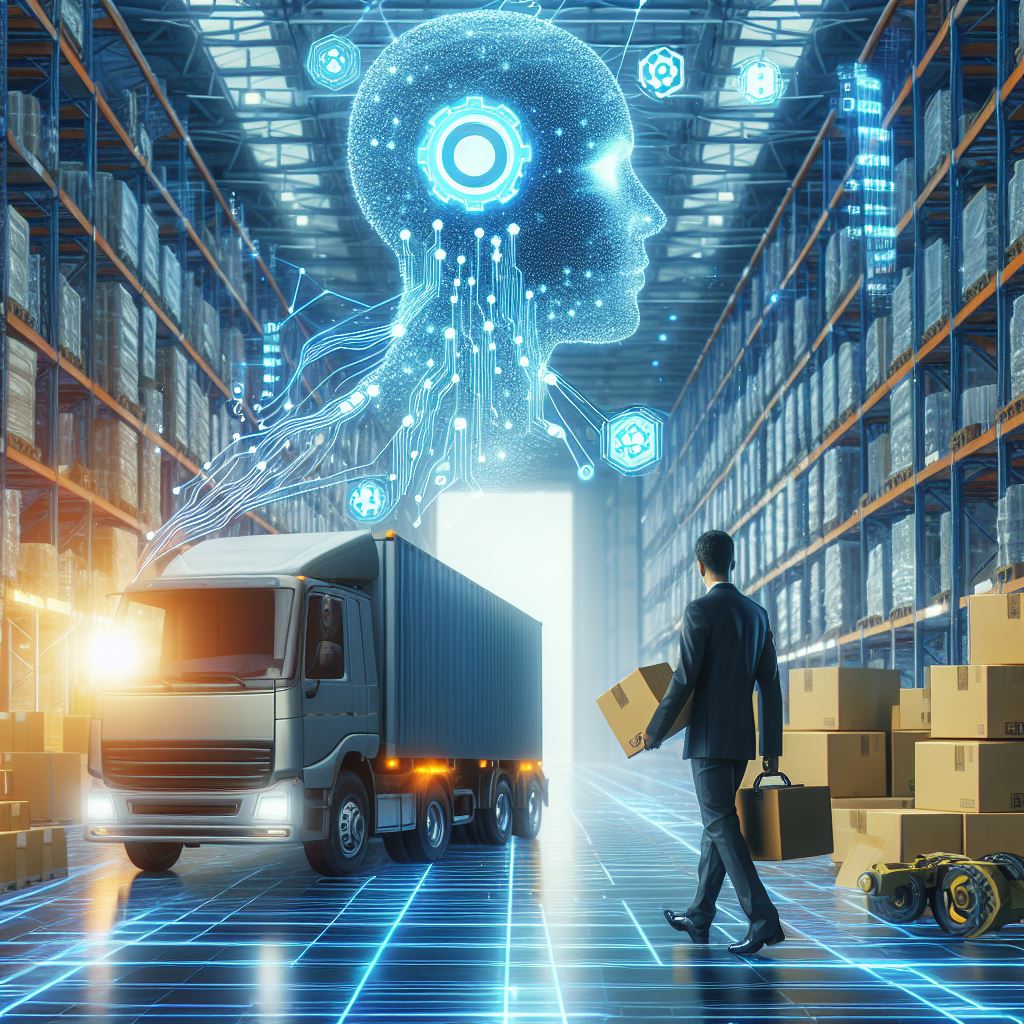AI for Logistics Process Automation
From managing inventory to optimizing transportation routes, the logistics industry relies heavily on streamlined processes to keep goods moving smoothly from point A to point B. With the advent of AI, logistics companies are experiencing a revolution in how they approach automation. AI has emerged as a powerful tool for optimizing various aspects of the logistics process, promising increased efficiency, reduced costs, and improved customer satisfaction.
In this blog series, we will explore the fascinating intersection of AI and logistics process automation. From predictive analytics to autonomous vehicles, we’ll delve into the innovative technologies shaping the future of logistics and examine the real-world applications driving tangible results for businesses around the globe.
The Need for AI in Logistics Process Automation
The logistics industry faces numerous challenges that can impact efficiency, cost-effectiveness, and customer satisfaction. From managing inventory levels to coordinating transportation routes, there are countless moving parts that require careful coordination and optimization. This is where AI, or artificial intelligence, steps in to revolutionize the way logistics processes are automated.
Complexity of Operations
Logistics involves a multitude of tasks such as inventory management, route planning, and scheduling, which can be overwhelming to handle manually. AI offers the ability to analyze vast amounts of data and make intelligent decisions quickly, helping to streamline these complex operations.
Dynamic Nature of Supply Chains
Supply chains are subject to constant change due to factors like fluctuating demand, weather disruptions, or unexpected delays. AI-powered algorithms can adapt to these changes in real-time, optimizing routes and adjusting schedules to minimize disruptions and ensure timely deliveries.
Data-Driven Decision Making
Traditional logistics processes often rely on historical data or human intuition to make decisions. AI, on the other hand, leverages advanced analytics and predictive modeling to forecast demand, identify trends, and optimize operations based on real-time data, leading to more informed decision-making.
Cost Reduction
Inefficient logistics processes can lead to increased costs due to factors like excess inventory, fuel consumption, or idle time. By automating tasks such as route optimization and inventory management, AI can help reduce costs associated with transportation, storage, and labor, ultimately improving the bottom line.
Enhanced Customer Experience
In today’s competitive market, customers expect fast, reliable, and transparent delivery services. AI-enabled logistics systems can provide real-time visibility into shipment status, accurate delivery estimates, and proactive problem-solving, enhancing the overall customer experience.
Benefits of AI in Logistics Process Automation
Let’s explore each of the benefits of AI in logistics process automation:
Increased Efficiency and Productivity
AI streamlines logistics processes by automating repetitive tasks, optimizing routes, and scheduling deliveries. By leveraging AI-powered algorithms, logistics companies can eliminate manual inefficiencies and allocate resources more effectively, resulting in faster turnaround times and increased productivity across the supply chain.
Cost Reduction through Automation
Manual logistics processes are often labor-intensive and prone to errors, leading to unnecessary expenses. AI automates tasks such as inventory management, demand forecasting, and route optimization, helping companies minimize costs associated with excess inventory, fuel consumption, and labor. By reducing operational expenses, AI enables logistics companies to achieve greater cost efficiency and maximize profitability.
Improved Accuracy and Reliability
Human errors can have significant consequences in logistics, leading to delays, inaccuracies, and unhappy customers. AI systems are capable of processing large volumes of data with precision and consistency, minimizing the risk of errors and ensuring the accuracy of critical tasks such as inventory tracking, order fulfillment, and delivery scheduling. By enhancing accuracy and reliability, AI contributes to smoother operations and increased customer satisfaction.
Enhanced Customer Satisfaction and Service Levels
Providing exceptional customer service is essential for success in logistics. AI enables logistics companies to offer personalized services, faster delivery times, and real-time tracking updates, enhancing the overall customer experience. By proactively addressing customer needs and preferences, AI-driven logistics systems help build trust and loyalty, leading to higher customer satisfaction and retention rates.
Optimized Resource Utilization
AI algorithms analyze data to optimize the allocation of resources such as vehicles, warehouses, and personnel. By dynamically adjusting resource allocation based on demand fluctuations and operational constraints, AI helps logistics companies maximize utilization rates and minimize waste, leading to greater operational efficiency and cost savings.
Faster Decision-Making
AI-powered analytics provide real-time insights into key performance metrics, enabling logistics managers to make informed decisions quickly and effectively. By reducing decision-making latency and improving responsiveness, AI enhances agility and adaptability in logistics operations.
Risk Mitigation and Resilience
Logistics operations are susceptible to various risks, including disruptions in supply chains, adverse weather conditions, and geopolitical events. AI enables logistics companies to anticipate and mitigate risks by identifying potential disruptions, simulating scenarios, and implementing contingency plans. By enhancing risk management capabilities, AI helps ensure business continuity and resilience in the face of unforeseen challenges.
Scalability and Flexibility
AI-driven logistics systems are inherently scalable and adaptable to evolving business needs. Whether scaling operations to meet seasonal demand peaks or adjusting to changes in market conditions, AI enables logistics companies to flexibly allocate resources, optimize processes, and accommodate growth without sacrificing efficiency or quality of service.
Continuous Improvement and Innovation
AI facilitates continuous improvement in logistics operations through ongoing analysis of data and performance metrics. By identifying areas for optimization, detecting patterns, and uncovering insights, AI enables logistics companies to iteratively refine their processes, drive innovation, and stay ahead of the competition. Through a cycle of experimentation and learning, AI fosters a culture of innovation and continuous improvement, leading to long-term success in the logistics industry.
Applications of AI in Logistics
Predictive Analytics for Demand Forecasting
Predictive analytics uses historical data, market trends, and external factors to forecast future demand for products or services. In logistics, AI-powered predictive analytics models analyze factors such as past sales data, seasonality, promotions, and economic indicators to accurately predict future demand for goods. By anticipating demand fluctuations, logistics companies can optimize inventory levels, plan production schedules, and ensure that the right products are available at the right time and location. This not only minimizes stockouts and excess inventory but also improves customer satisfaction by ensuring product availability.
Route Optimization and Dynamic Routing
Route optimization involves determining the most efficient routes for transporting goods from origin to destination. AI algorithms consider factors such as traffic conditions, road closures, delivery time windows, vehicle capacity, and fuel efficiency to optimize routes in real-time. Dynamic routing further enhances this process by continuously updating routes based on changing conditions. By optimizing routes, logistics companies can minimize fuel consumption, reduce transportation costs, and improve delivery efficiency. This results in faster delivery times, lower emissions, and increased customer satisfaction.
Warehouse Automation and Robotics
Warehouse automation involves the use of robotics and AI-powered technologies to automate repetitive tasks such as picking, packing, and sorting goods in warehouses. AI algorithms enable robots to navigate warehouse environments, identify items, and perform tasks autonomously. Automated guided vehicles (AGVs) and robotic arms are used to transport and manipulate goods, while AI-powered software systems coordinate warehouse operations and optimize inventory placement. Warehouse automation improves efficiency, reduces labor costs, and minimizes errors, leading to faster order fulfillment, higher throughput, and improved warehouse safety.
Supply Chain Visibility and Tracking
Supply chain visibility refers to the ability to track the movement of goods and monitor their status throughout the supply chain. AI-powered tracking systems use technologies such as GPS, RFID, and IoT sensors to provide real-time visibility into the location, condition, and status of goods at every stage of the supply chain. AI algorithms analyze this data to detect potential delays, identify bottlenecks, and optimize supply chain processes. By improving visibility and transparency, logistics companies can better manage inventory, mitigate risks, and respond quickly to disruptions, ultimately enhancing supply chain resilience and customer satisfaction.
Autonomous Vehicles for Last-Mile Delivery
Autonomous vehicles, including drones and self-driving delivery vehicles, are increasingly being used for last-mile delivery operations. AI-powered autonomous vehicles use sensors, cameras, and onboard computers to navigate roads, avoid obstacles, and deliver packages to customers’ doorsteps without human intervention. These vehicles can operate 24/7, navigate complex urban environments, and optimize delivery routes based on real-time traffic conditions. Autonomous last-mile delivery reduces delivery costs, improves delivery speed, and enhances customer convenience, especially in densely populated areas or during peak demand periods.
Customer Service Chatbots and Virtual Assistants
AI-powered chatbots and virtual assistants provide customer support and assistance throughout the logistics process. These intelligent systems use natural language processing (NLP) and machine learning algorithms to understand customer inquiries, provide relevant information, and assist with order tracking, delivery updates, and returns processing. Chatbots can handle a large volume of customer queries simultaneously, reducing the need for human intervention and improving response times. By offering 24/7 support and personalized assistance, AI-powered customer service solutions enhance customer satisfaction, reduce operational costs, and streamline the customer experience.
Challenges and Considerations of Implementing AI in Logistics
Data Integration and Quality
One of the key challenges in implementing AI in logistics is the integration of data from various sources and guaranteeing its quality. Logistics operations generate vast amounts of data from sources such as sensors, GPS systems, warehouse management systems, and customer databases. Integrating this data into AI systems can be complex and requires interoperability between different systems and data formats.
Furthermore, ensuring data quality, accuracy, and consistency is essential for AI algorithms to produce reliable insights and predictions. Poor data quality or incomplete data can lead to inaccurate analysis and suboptimal decision-making, undermining the effectiveness of AI-powered solutions.
Investment and Infrastructure
Implementing AI in logistics requires significant investment in technology infrastructure, software development, and talent acquisition. Building and maintaining AI-powered systems entails costs associated with hardware, software licenses, data storage, and IT infrastructure upgrades.
Additionally, developing and training AI algorithms requires specialized expertise in data science, machine learning, and AI programming, which may require hiring or upskilling existing personnel. Furthermore, integrating AI systems into existing logistics operations and workflows may necessitate changes to processes, organizational structures, and IT systems, adding to implementation costs and complexity.
Job Displacement Concerns
The adoption of AI and automation in logistics raises concerns about potential job displacement and the impact on the workforce. As AI-powered systems automate repetitive tasks such as order fulfillment, inventory management, and transportation planning, there is a risk of job loss for workers performing these tasks manually. This can lead to workforce disruption, unemployment, and socio-economic challenges in affected communities.
Moreover, there may be resistance to AI implementation from employees who fear losing their jobs or are skeptical about the benefits of automation. Addressing these concerns requires proactive workforce planning, reskilling initiatives, and measures to mitigate the impact of automation on displaced workers, such as job retraining programs, career counseling, and support for transitioning to new roles or industries.
Conclusion
The benefits of AI in logistics process automation are clear: increased efficiency, cost reduction, improved accuracy, and enhanced customer satisfaction. By leveraging AI-powered technologies, logistics companies can streamline operations, optimize resource utilization, and navigate the complexities of modern supply chains with greater agility and precision.
As we look to the future, the continued evolution of AI in logistics holds the promise of even greater efficiency, resilience, and customer-centricity. By staying at the forefront of AI adoption and innovation, logistics companies can position themselves as leaders in the digital age, delivering value to customers, stakeholders, and society as a whole.
Ready to streamline your logistics operations with AI? Contact RTS Labs to learn how our AI-driven solutions can optimize your supply chain processes and enhance efficiency.






